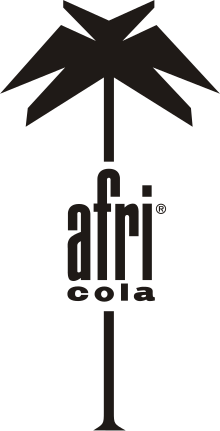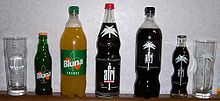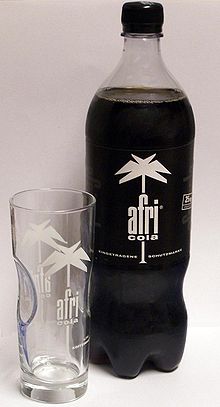Afri-Cola
Afri Cola (of "African cola nut " brand notation: "Afri Cola") is one of Germany coming Cola - brand and was on 26 June 1931 by F. Blumhoffer successor GmbH as a trade mark registered. The orange lemonade Bluna comes from the same company . Originally the headquarters of the brand was in Cologne-Braunsfeld . The Karl Flach family from Cologne owned the brand for decades . Today, the trademark rights are held by Mineralbrunnen Überkingen-Teinach KGaA , which is majority owned by the Homburg- based Karlsberg Group , which also takes on the bottling. Bottling has also been carried out at Rhodius -Mineralquellen GmbH since 2015 .
history
The company F. Blumhoffer Nachhaben GmbH was founded in 1864 on the Cologne wood market. At first only essences were produced for making schnapps, liqueurs and lemonades. Before the turn of the century , the company focused on making lemonade .
Fight against Coca-Cola during the Nazi era
In the 1930s, company boss Karl Flach ran an advertising campaign against the market leader Coca-Cola , which aimed at widespread anti-Semitic attitudes in the German Reich: from a factory tour of the US headquarters, he took bottle caps with the word “kosher” in Hebrew script and presented them in the German Reich as proof that Coca-Cola was a Jewish company. Max Keith , head of Coca-Cola Germany, who had a very good relationship with the Nazi regime, unsuccessfully demanded the removal of a Jewish member of the supervisory board of his group.
Competition in the 1960s
From 1960 to 1962, Afri Cola sponsored a cycling event that was named after it, the International Afri-Cola Tour of Germany . Today she is referred to as the predecessor of the Germany Tour .
In the fierce competition with Coca-Cola, Afri Cola lost significant market share in the 1960s. An attempt to stop the downward trend was successfully launched at the end of the 1960s with a large-scale advertising campaign by the Düsseldorf advertising designer and photographer Charles Wilp , for which the bottle design by Jupp Ernst , which is still current today, was introduced in 1962 . The campaign with the slogan " sexy-mini-super-flower-pop-op-cola - everything is in afri-cola ... " was shaped by the commercial. Young girls moved lasciviously behind a pane of glass over which water ran. It was particularly provocative at the time that they were disguised as nuns in some spots . The Catholic Church protested against these spots.
In the late 1980s, the company temporarily withdrew from manufacturing and focused on branding. In those years, Afri Cola was only produced under license . In 1996 there was a complete U-turn: The network of third-party bottlers that had existed since the 1930s was dissolved and production centered in one place.
Redesign
Until 1998, Afri-Cola was in the hands of the founding family and was operated as Afri Cola GmbH in Cologne-Braunsfeld, then Mineralbrunnen Überkingen-Teinach AG bought the trademark rights . Following the retro trend, this attempted to revive the Afri Cola and Bluna brands . The original caffeine content of 25 mg / 100 ml was drastically reduced and the sugar content increased to the level of the market leaders. However, this move to sell an inexpensive standard recipe under the well-known brand name Afri Cola soon turned out to be the wrong decision. The hoped-for “ cult effect” was not enough as the sole distinguishing feature to attract buyers from the competition. In addition, three former "regular customers" brought a cola onto the market under the name Premium-Cola, which is bottled with the minimally modified original recipe from Afri, thus causing negative press reports about Afri Cola.
Company policy from 2001
In 2001, a television campaign with the slogan “ everything is in afri-cola ” was directed by Wim Wenders .
In 2002 afri-cola changed the advertising slogan to " ... and everything will be afri ". At the same time, a new television commercial was designed. The song for the commercial with the title Everytime (a soundalike of the title The More I See You , by Chris Montez) was sung by the Mannheim band The Flames and was in the charts for a few weeks in 2002 .
Today Afri Cola is produced at four Mineralbrunnen Überkingen-Teinach AG locations: Bad Teinach , Fachingen , Kißlegg and Güstrow . In addition, Afri Cola has also been produced in Ulm since 2017 , as the Gold Ochsen brewery produces for Mineralbrunnen Überkingen-Teinach AG. It is officially exported to Switzerland , Austria , the Czech Republic , Saudi Arabia , Ghana , France, South Korea and South Africa
Since April 1, 2006, the caffeine content at Afri Cola has been reset to the previously usual value of 25 mg / 100 ml. This is also shown on the crown cap. At the same time, Afri Cola also launched the new light variant on the market: Afri White , also with the high caffeine content, but without sugar.
The market share is only a few tenths of a percent. Approximately three million liters are filled annually (as of 2005).
The proportion of Afri White in relation to normal Afri Cola is 1: 7 (as of 2009).
In summer 2010, Afri Red, another variant as an energy drink, was introduced. With 32 mg caffeine per 100 ml, the variant has an even higher caffeine content and was enriched with vitamins. There was also Afri Guarana .
In May 2011, according to customer surveys, the varieties Afri White were renamed to afri sugarfree and Afri Red to Afri Power . At the end of March 2015 there was a new range of products. The classic Afri Cola was renamed to afri cola 25 , and afri sugarfree became afri cola without sugar . A third variety, simply called afri cola , was introduced, which is characterized by a caffeine content reduced to 10 mg / 100 ml.
Art competitions
In 2007 afri organized a short film competition, the afri Jungfilmer Award . The winner was determined from 102 submitted entries through an online voting and rewarded with prize money of 5000 euros and the black palm . Due to the unexpectedly high participation for the company, it decided to hold a competition for 2008, the Afri Art Award , in which artistic works related to the brand could be submitted. The award ceremony took place in October of that year.
design
The product design for Afri Cola, introduced in 1962, was created by Jupp Ernst in collaboration with a network of artists that included Wilhelm Wagenfeld , Hans Schwippert and Willem Sandberg . The 0.2 l glass bottle and the Afri-Cola glass still have the typical notches at medium height, which are supposed to be reminiscent of a woman's waist. The palm tree in the logo is also one of the distinguishing features of the drink. Together with the name "afri", it symbolized extraordinary exoticism during the brand's creation. The original Afri Cola palm as well as the Bluna sign, the original bottle construction and the two names were designed and executed in the early 1930s by the freelance Cologne painter Rafael Becker (1895–1979) for Flach and Blumhoffer Nachhaben GmbH in Cologne.
See also
- List of cola brands
- International Afri Cola Tour of Germany 1960
- International Afri Cola Tour of Germany 1961
- International Afri Cola Tour of Germany 1962
Web links
- Official website of Afri-Cola
- “Afri Cola is celebrating its 80th birthday.” 80 years different. Retrieved March 20, 2011
References
- ↑ Trademark register
- ↑ Rhodius press release July 10, 2014 ( Memento from September 24, 2015 in the Internet Archive )
- ↑ Coca-Cola Goes to War: The Coca-Cola Company Under the Nazis ( Memento of December 6, 2015 in the Internet Archive ) On: Archived copy ( Memento of January 15, 2016 in the Internet Archive ). May 29, 2007, 00:30 a.m.
- ↑ 1968 commercial on YouTube
- ↑ a b For the love of soda ; Premium Cola vs. Afri-Cola; Achim Graf; The Time No. 34, 2005; August 18, 2005
- ^ History of Afri-Cola ( Memento from July 27, 2013 in the Internet Archive ) on afri.de, January 4, 2008
- ↑ http://www.40ouncebeer.com/energydrinks/afriguarana.html
- ↑ http://www.about-drinks.com/marken-und-produktrelaunch-alles-bleibt-anders-mit-dem-neuen-sortiment-von-afri/
- ↑ http://afri.de/#products
- ↑ Press release: afri Jungfilmer Award - follow-up report ( memento of November 14, 2008 in the Internet Archive ) August 26, 2007
- ↑ Press release of February 18, 2008: announcement of the afri Art Award ( Memento of November 14, 2008 in the Internet Archive )
- ↑ Frank Becker: Kultur in Wuppertal ( page no longer available , search in web archives ) Info: The link was automatically marked as defective. Please check the link according to the instructions and then remove this notice. In: Westdeutsche Zeitung , December 20, 2005
- ↑ Photo gallery: Spiegel Onlines Markenwelt In: Spiegel Online September 23, 2004
- ↑ Becker Family Archive, February 5, 2012






